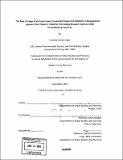The role of large-scale government-supported research institutions in development : lessons from Taiwan's Industrial Technology Research Institute (ITRI) for developing countries
Author(s)
Iqbal, Fareeha Yasmin, 1974-
DownloadFull printable version (6.282Mb)
Other Contributors
Massachusetts Institute of Technology. Dept. of Urban Studies and Planning.
Advisor
Alice Amsden.
Terms of use
Metadata
Show full item recordAbstract
This thesis seeks to examine the extent of the role that the Industrial Technology Research Institute (ITRI) played in Taiwan's high-technological development and whether developing countries of today can promote such development by creating similar institutional arrangements. Literature on innovation systems was reviewed, particularly national innovation systems and the role of R&D institutions within these. Taiwan's recent economic success, deemed attributable to economic and institutional reforms in recent decades, was also studied. In depth analysis was carried out of its leading high-technological research institute, ITRI, which bridges the gap between industry and academia. Although the case of Taiwan is sometimes presented as a unique example of industrial success of an SME-based state, this thesis argues that this success was possible because the research and development process had a large institute at its core. One way of creating such a research scale is by merging existing institutes, a process that would result in more efficient use of capital and human resources. The case of high-technological development in Pakistan is briefly assessed in order to gauge how its existing institutions structure could be amended to allow such changes to be made. The study concludes with the following three main points: (i) scale is an important factor: Taiwan's SME-based industry was able to succeed because of a large research institute at its core; (ii) in developing countries, governments decide which form of high-technology to pursue and when; thus, timing and choice of sector are important; and (iii) political leadership was seen to be important in the case of Taiwan's development in high-technology, and can play a key role in developing countries of today.
Description
Thesis (M.C.P.)--Massachusetts Institute of Technology, Dept. of Urban Studies and Planning, 2003. Includes bibliographical references (leaves 83-89).
Date issued
2003Department
Massachusetts Institute of Technology. Department of Urban Studies and PlanningPublisher
Massachusetts Institute of Technology
Keywords
Urban Studies and Planning.